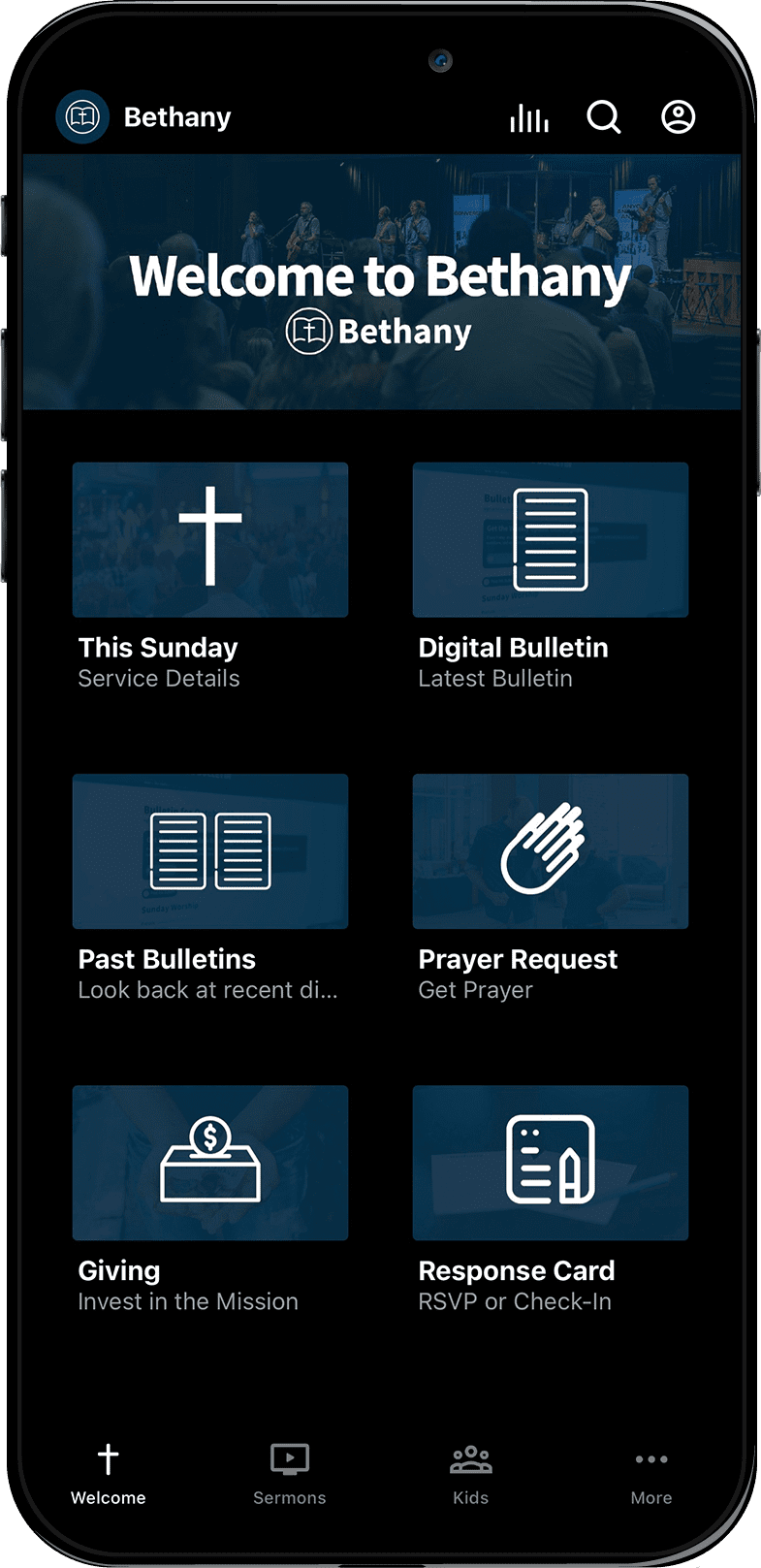In This Series
The Blessing of Rejection
Acts 4:1-12 (ESV)
February 14, 2021
Dr. Ritch Boerckel
We’re going to be in Acts chapter 4. We’ve been continuing this series in Acts, which is Part 2 of Luke’s gospel. It’s an explanation of what Jesus continues to do and teach after He ascends to the right hand of God the Father. Remember last week, Peter and John were going to the temple to pray and they came across this lame man. And in the name of Jesus, this lame man was healed. I’m so thankful to know that God does that still. He does that in bodies. He does that in souls. That’s the work of Jesus. So, Acts chapter 4.
1 And as they were speaking to the people, the priests and the captain of the temple and the Sadducees came upon them, 2 greatly annoyed because they were teaching the people and proclaiming in Jesus the resurrection from the dead. 3 And they arrested them and put them in custody until the next day, for it was already evening. 4 But many of those who had heard the word believed, and the number of the men came to about five thousand.
5 On the next day their rulers and elders and scribes gathered together in Jerusalem, 6 with Annas the high priest and Caiaphas and John and Alexander, and all who were of the high-priestly family. 7 And when they had set them in the midst, they inquired, “By what power or by what name did you do this?” 8 Then Peter, filled with the Holy Spirit, said to them, “Rulers of the people and elders, 9 if we are being examined today concerning a good deed done to a crippled man, by what means this man has been healed, 10 let it be known to all of you and to all the people of Israel that by the name of Jesus Christ of Nazareth, whom you crucified, whom God raised from the dead—by him this man is standing before you well. 11 This Jesus is the stone that was rejected by you, the builders, which has become the cornerstone. 12 And there is salvation in no one else, for there is no other name under heaven given among men by which we must be saved.”
You remember that Jesus first encounters Peter by the Sea of Galilee. He and his brother Andrew are fishing. Jesus comes alongside of them and He says,
Mark 1:17 Follow me, and I will make you become fishers of men.”
For the next three years then, Jesus will train Peter along with the other eleven disciples, to follow Him, instructing them in how to fish for men. He teaches Peter how to be like Him in His attitudes, His words, His values, His obedience to the Father, His faithfulness, His mission. As the book of Acts opens, we find Peter is now a fisher of men. Jesus’ discipleship is successful. It’s effective. He is a man who imitates Jesus through his words, his works and his relationships so much so, that Peter looks like Jesus. This is not in physical appearance, but in his character, in his demeanor, in the way he lives his life, in the way he speaks. Peter’s focus now is like a laser planted on this mission to fish for men, to bring the gospel of Jesus that is life-giving, that connects people to God so that others might have an opportunity to believe. And it’s not just believers that see this resemblance, but it’s unbelievers that see this resemblance between Peter and Jesus as well.
In Acts 4, you might just skip down to verse 13. When they saw the boldness of Peter and John, they recognized that they had been with Jesus. What a word of affirmation! Those are words that we would long for others to speak over our lives as well. That others would look at our lives and see the way we act and see what we say and what’s important to us and say, “I recognize that’s a man, that’s a woman who has been with Jesus. This is a person who is following Him. This is a person who is imitating Him.”
Now I want to ask you a personal question. How about you? If you are a believer in Jesus Christ, how about you? When others look at your life, observe your priorities, observe what’s important to you, what you talk about and what you do, do they observe that you are very much like Him? Imitation is a key mark of discipleship. Every believer is called to be an imitator of Jesus. Think of what Paul says in 1 Corinthians 11.
1 Corinthians 11:1 Be imitators of me, as I am of Christ.
Paul would say again in Ephesians 5,
Ephesians 5:1-2 Therefore be imitators of God, as beloved children. And walk in love, as Christ loved us and gave himself up for us, a fragrant offering and sacrifice to God.
1 Thessalonians 1:6 And you became imitators of us and of the Lord, for you received the word in much affliction, with the joy of the Holy Spirit,
The Greek word for imitator is mimetes (mim-may-tase). We get the English word “mimic” from this term. As disciples of Jesus, we fix our eyes upon Him and we mimic Him. Since Jesus is continuing His ministry in this world, it’s vital that the current ministry of Jesus is filled with disciples who mimic Him, who imitate Him. We are His instruments. You see, without mimics of Jesus there is no modern day ministry from Jesus. All ministry flows from imitation. Ministry doesn’t flow from innovation. It flows from imitation. Everyone wants to be an innovator, while God’s Word says no, be an imitator. Look to Jesus. Think the way Jesus thinks. Speak the way Jesus speaks. Behave the way Jesus behaves. Relate to God and others the way Jesus relates.
The story we look at today in Acts 4 is a continuation of the story that is begun in Acts 3. In this story, we see Peter imitating Jesus. He imitates Jesus in His compassion. He imitates Jesus in His communication. He imitates Jesus in His courage. We see Peter imitating Jesus in His compassion because when he walks to the temple that day to pray, he notices a lame man. This is a lame man he undoubtedly had seen many, many times before. But this day, he notices him. He notices him because he sees with the eyes of Jesus. And he mimics Jesus’ compassion. He stops and he asks God to minister through him to the needs of this specific man. A key component in imitating Jesus is taking time out of our busy schedules, out of the agenda of our day, to serve others in love by personally ministering to people as we see them in need.
We see then Peter is like Jesus in His communication. He boldly tells this crowd of people, a group of people who were filled with really powerful influencers, people who just almost two months ago were people who crucified Jesus and had the power to be able to enact that wrongdoing. Peter speaks boldly and he tells them they need to repent of their sin and believe in Jesus as the Messiah and bow their knee to Him as King. A key component to imitating Jesus is boldly telling others that Jesus is King, that He’s Lord, He’s Savior. He alone is the one who can rescue us from our sin.
And then we see Peter imitating Jesus in His courage. Remember at one time just a couple months earlier, Peter denied Jesus three times in the presence of a little girl. A little girl scared him when she asked, “Are you one of His disciples?” “No! I never knew the man,” Peter would say. But now, here Peter is preaching publicly to really powerful people and he is proclaiming that Jesus is the Messiah, that He was crucified and that He is resurrected as Lord. A key component to imitating Jesus is being willing to suffer rejection for the sake of Jesus, for the sake of God’s glory.
So as we prepare to look at this story in Acts 4:1-12, I again ask you to consider this very personal question. Am I imitating Jesus? Does my mindset, my values, my behaviors, my words, my priorities, does it reflect Jesus? Am I growing to be more like Jesus in His compassion? Am I growing to be more like Jesus in His communication? Am I growing to be more like Jesus in His courage?
When we imitate Jesus, we can expect one of two results. First, we can expect God to do miracles in other people’s lives. He opens up their heart and brings them new life. That happens here in this story. But we can also expect rejection. Today we’re going to consider the blessing of rejection. It is a blessing from the Lord, intended to fill us with joy in God. The first thing we notice, as you’re taking notes this morning, is
The Reality of Rejection
Jesus has just healed this 40 year old man who has been lame from birth. He heals this man through these weak instruments of Peter and John. But it’s Jesus’ name that provides the power. Peter then preaches a sermon that lifts up Jesus as this glorious resurrected Messiah, the King, the Lord of all. Let’s just take a moment to read some of that sermon from Acts 3.
Acts 3:12 “Men of Israel, why do you wonder at this, or why do you stare at us, as though by our own power or piety we have made him walk?
Peter is saying, “It’s not us, guys!”
Acts 3:13 The God of Abraham, the God of Isaac, and the God of Jacob, the God of our fathers, glorified his servant Jesus,
And notice this. Peter’s message is confrontational. He says
Acts 3:13-21 whom you delivered over and denied in the presence of Pilate, when he had decided to release him. But you denied the Holy and Righteous One, and asked for a murderer to be granted to you, and you killed the Author of life, whom God raised from the dead. To this we are witnesses. And his name—by faith in his name—has made this man strong whom you see and know, and the faith that is through Jesus has given the man this perfect health in the presence of you all. “And now, brothers, I know that you acted in ignorance, as did also your rulers. But what God foretold by the mouth of all the prophets, that his Christ would suffer, he thus fulfilled. Repent therefore, and turn back, that your sins may be blotted out, that times of refreshing may come from the presence of the Lord, and that he may send the Christ appointed for you, Jesus, whom heaven must receive until the time for restoring all the things about which God spoke by the mouth of his holy prophets long ago.
Notice that Peter’s message is not one of compromise and conciliation. Again, just about two months earlier, Peter observed how these very same folks treated Jesus. Perhaps it would have been easy to say, “Well, that didn’t really work out that well, to be that bold, that clear, that confrontational. Maybe we could take a little different tack. Maybe we could be a little more conciliatory to them.” No, Peter seems to double down on the confrontation that the gospel, the good news message, brings to such a one. Surprisingly, by God’s grace, some who heard that very confrontational message received it. They were humbled by it. The truth here is that the gospel first offends before it saves. The folks in this audience needed to be offended. They needed to see their own sinfulness, their own rejection of God Himself, before they would open up their heart of their need for a Savior. And here, we’re told that
4 But many of those who had heard the word believed,
They trusted in Jesus Christ as their Savior. They repented of their sin. They repented of their rejection of God.
and the number of the men came to about five thousand.
So here, this little church began with that first sermon from Peter on the Day of Pentecost. 3,000 came to know the Lord. And now there are 5,000 men in the church, along with women and children. Now, some however, who heard this message, became really, really mad.
1 And as they were speaking to the people, the priests and the captain of the temple and the Sadducees came upon them,
That word “came upon them” is sort of a forceful term. It’s like coming to arrest somebody. It’s getting in their face. So these guys got in the face of Peter and John. They’re
2 greatly annoyed
In other words, they’re angry.
because they were teaching the people and proclaiming in Jesus the resurrection from the dead. 3 And they arrested them and put them in custody until the next day, for it was already evening.
Remember, Peter and John went to the temple about 3:00 because that’s one of the times for prayer. So, this incident unfolds and now it’s likely past 5:00. The courts are no longer in session, so “let’s throw them in jail.” And that’s what they did.
5 On the next day their rulers and elders and scribes gathered together in Jerusalem, 6 with Annas the high priest and Caiaphas
Where have we heard their names before? Again, just less than two months earlier, these were the guys before whom Jesus stood on trial on that early Friday morning, and it was a mockery of justice. And now these guys undoubtedly have been told when they were put in prison, “Tomorrow morning, you’re going to be set before Caiaphas and Annas.” And now, these guys are the one who are trying Peter and John.
Luke takes pains to describe the enemies of the Message as a very diverse group. He talks about priests who are Levites who serve in the Temple. He talks about the captain of the temple guard. They’re kind of like the temple police force. They’re Jewish men who are given authority by Rome to keep the peace in that particular area. Then there are Sadducees. These were really wealthy people. They really don’t believe in God. They have a Bible, but they don’t believe it. They don’t believe in the resurrection from the dead. They’re very secular. Then there are these elders and rulers and scribes. These are likely the Pharisees. They actually have a Bible and they believe it. They just misunderstand it and misapply it. Then there is Annas and Caiaphas and John and Alexander. These are the high priests whom you remember, again, were the ones who were the first to try Jesus. All of these thought that with Jesus’ crucifixion that the “Jesus problem” was fixed. What binds this odd group of people together? They would have never been at the same birthday party together. They didn’t have much in common. The one thing they had in common was their shared rejection of Jesus and their mutual dislike for the Gospel.
So these Sadducees and the Temple guard come upon Peter and John. They’re greatly annoyed at the miracle because the miracle is drawing attention to the message. And they arrest them and put them in jail and the next morning they’re on trial. Peter and John are placed in jail and they’re told that the next morning, they’re going to be tried by Caiaphas and Annas. Do you imagine that there was any bit of fear that rolled through their hearts that night? I think there was. We’re not told, but they’re human. They understood what a painful death crucifixion is. They understood that these two guys they’re going to stand before had a mockery of justice with Jesus and they were authorized by Rome then to influence a crucifixion against Jesus. They’re undoubtedly thinking, “This could be us.” But I also believe that as they were sitting in that jail, they’re praying and the Holy Spirit is filling them and giving them courage, because by morning time, when the morning breaks, their hearts are full of faith. We see that in the way they respond to the trial that’s about to befall them.
There is a reality to rejection that’s really important for us as followers of Jesus Christ to embrace. We’re not to deny it so that we would be surprised when it happens. But we’re to expect it. So there are some applications of the reality of rejection that believers face in this world that rejects God. The first application is let’s expect it. Let’s expect to be rejected by many who reject Jesus. If we are faithful to imitate Jesus, rejection by this world is unavoidable. Much is written about the “cancel culture” of today as though it’s something new. But the cancel culture is not new. 2,000 years ago Jesus talked about it. Jesus says in John 15
John 15:18 “If the world hates you, know that it has hated me before it hated you.
John 16:1-2 “I have said all these things to you to keep you from falling away. They will put you out of the synagogues.
They’re going to cancel you. They’re not going to let you go into the synagogues, where people learn the Scriptures. That’s what is going to happen. You’re going to approach the synagogue and be told, “Oh, you’re one of those Jesus people. No, you can’t even come here. You can’t be part of this community. Out, out, out you go.” And it’s not just that kind of canceling, but it becomes even more violent, Jesus says.
John 16:2-3 Indeed, the hour is coming when whoever kills you will think he is offering service to God. And they will do these things because they have not known the Father, nor me.
Jesus would say then,
John 16:33 In the world you will have tribulation. But take heart; I have overcome the world.”
Be full of courage. Be full of faith because Jesus has overcome the world. In other words, it’s going to end really, really well for all who are in Him.
Beloved, we must not fear being rejected by people who reject Jesus, nor should we be surprised by it. The truth is, not one of us desires to harm relationships that we value. Not one of us! It’s not fun to see relationships that we treasure being broken apart. Where there once was sort of a friendship, there is now a separation. If we follow Jesus, this kind of experience is unavoidable. Imitating Jesus means that we care more for God’s glory than we do for man’s approval. If we live for Jesus, Jesus tells us that many of our relationships in this world will suffer for it. That’s part of discipleship.
The second application I would bring to the reality of rejection is to not just expect it, but tell the whole truth. In other words, let us not package the Gospel in a way so as to make it less offensive to unbelievers. Let’s be really careful of trying to make the Gospel become more appealing by stripping the message of its offense. If we strip the offense out of the Gospel we actually lose the Gospel. Because the first thing that all of us need is the confrontation of our own self-will, of our own vain glory, of our own commitment to go our own way. And if we’re never told, “Stop! You’re walking in the wrong direction, away from God, and it’s you that is the problem with your life, not anyone else. It’s you! You’re walking away from God.” If that part of the message, which is really offensive to a person who loves going their own way and wants to continue to go their own way, if that part of the message is left dormant and silent, then we’ve destroyed the message. It’s an essential part. Repentance has no meaning apart from the confrontation regarding our own sin.
Now of course, in our communication of the Gospel, we are right to avoid unnecessary, indeed, ungodly offense. And it is true that sometimes we share the message of the gospel with kind of a self-righteousness, like we’re better than you or with kind of an emotional indignation, a frustration, even. These are not worthy of Jesus and they’re certainly not an imitation of Him. But let us tell the whole truth.
The third application regarding the reality of rejection is, let’s look toward our reward. We have every reason to look toward a future day when rejection will not be part of our experience. And we as believers are people who live in view of this greater future reality. Why would we proclaim Jesus if our alignment with Him destroyed other friendships that we treasure in this world? The answer is because no one who lives for Jesus ever loses! Jesus is life itself. And if we are to be valuable to those who reject us, we must maintain a Jesus center. Listen to what Jesus says in Mark.
Mark 10:29 Jesus said, “Truly, I say to you, there is no one who has left house or brothers or sisters or mother or father or children or lands, for my sake and for the gospel,
He’s talking about relationships.
Mark 10:30-31 who will not receive a hundredfold now in this time, houses and brothers and sisters and mothers and children and lands, with persecutions, and in the age to come eternal life. But many who are first will be last, and the last first.”
Peter himself, I believe in reflection upon many of these experiences that we’re going to read about in Acts, would write this in 1 Peter 4.
1 Peter 4:12 Beloved, do not be surprised at the fiery trial when it comes upon you to test you, as though something strange were happening to you.
As if this was something really unusual and hardly anybody who follows Jesus has that kind of rejection happen. He says
1 Peter 4:13 But rejoice insofar as you share Christ’s sufferings, that you may also rejoice and be glad when his glory is revealed.
There is a future day!
1 Peter 4:14 If you are insulted for the name of Christ, you are blessed, because the Spirit of glory and of God rests upon you.
It just adds to the joy. It adds to the happiness. It adds to the reward and goodness of that future day. Why is it then that this message of Jesus, the imitation of Jesus, produces such a hostile response?
The Reasons for Rejection
7 And when they had set them in the midst, they inquired, “By what power or by what name did you do this?”
This is rather remarkable! These guys are still completely blind to God. They’re not marveling that a man who they know has been lame from birth, for forty years, is now leaping around in the temple, praising God and worshiping God. That’s not their focus. Their focus is, “By what name, tell me exactly, did this man who has been lame for forty years, now be enabled to leap with joy? By what name?”
Now, of course they knew the answer. Peter hasn’t been unclear in the message that he preached right before the question. Look back with me to Acts 3. They’ve heard this message. They heard what Peter had said the day before.
Acts 3:14-16 But you denied the Holy and Righteous One, and asked for a murderer to be granted to you, and you killed the Author of life, whom God raised from the dead. To this we are witnesses. And his name—
That’s Jesus!
Acts 3:16 by faith in his name—
They keep kind of pounding it again.
Acts 3:16 has made this man strong whom you see and know, and the faith that is through Jesus has given the man this perfect health in the presence of you all.
They already told in whose name this man was healed. They already said it. So why did these really smart guys ask the question the next morning? The answer was to intimidate. They likely thought, “Well, these two guys can be all bold and using the name of Jesus in a public marketplace when they think there’s not going to be that many repercussions and a lot of people are excited about a man who is healed. But let us let them soak in a jail cell anticipating a trial that they know could lead to their death, and then we’ll ask them and see if they’re still as bold the next day.” That’s what they thought. They thought that through intimidation, they could silence these guys once and for all.
The heart of rejection is the heart of unbelief. When we are rejected by people that we care about because of Jesus, we are often bewildered. We’re often hurt. Why would these have such a strong reaction against us, against followers of Jesus, against those who proclaim the gospel? I believe there are three reasons that unbelief brings rejection to Christ-followers. First, the Gospel threatens the world’s agenda. It threatens the world’s power. It threatens the world’s values. Skip down to verses 16-18. These rulers overseeing the trial asked,
Acts 4:16-17 What shall we do with these men? For that a notable sign has been performed through them is evident to all the inhabitants of Jerusalem, and we cannot deny it. But in order that it may spread no further among the people, let us warn them to speak no more to anyone in this name.”
They couldn’t even say His name.
Acts 4:18 So they called them and charged them not to speak or teach at all in the name of Jesus.
You see, Jesus threatened their power, their authority, their values, their agenda. From Herod in Jesus’ day to Pontius Pilate, to Caiaphas and to Annas, to the present modern times; people like Stalin and Chairman Mao. And then to the secularists in our current context, in our own nation, unbelievers in power constantly drive to silence the message of the Gospel at all costs. They drive to silence the name of Jesus. Unbelievers understand the power of Jesus to win hearts. They ridicule the gospel, but they respect its power. They believe this is why at all costs, we have to keep it out of the public sphere. They know that Christ’s Lordship threatens the influence that they long to have over people. Because you see, when people have Jesus as Savior and Lord, no one usurps His authority. No one usurps His dominion. In fear and jealousy, the powerful of this world see the Gospel as a threat to their dominion. And they should, because the Gospel is a threat to the dominion of man. The Gospel frees hearts from bondage and slavery of every kind and liberates us to live freely before the Lord. The Gospel threatens the world’s agenda. The second reason unbelief brings rejection to Christ-followers is that the Gospel confronts the wickedness of our hearts.
8 Then Peter, filled with the Holy Spirit,
It’s the Holy Spirit that undergirds Peter and John in this time when they are being threatened with imprisonment and perhaps torture and death.
8 Then Peter, filled with the Holy Spirit, said to them,
The rulers think they’re going to intimidate them and back them into a corner, but here’s Peter’s answer. It’s under the power of the Holy Spirit.
“Rulers of the people and elders, 9 if we are being examined today concerning a good deed done to a crippled man, by what means this man has been healed, 10 let it be known to all of you and
In fact, not just to the people who are here in this courtroom, but
to all the people of Israel that by the name of Jesus Christ of Nazareth,
I love that! They didn’t just say, “By the name of Jesus.” They said by the name of Jesus, the Messiah, of Nazareth. That’s Him. That’s the one in whose name this person is healed.
whom you crucified, whom God raised from the dead—by him this man is standing before you well. 11 This Jesus is the stone that was rejected by you, the builders, which has become the cornerstone.
Do you see what Peter’s message is? You’re supposed to be building the kingdom of God. You’re the builders. And you take the chief cornerstone, the most important stone to the entire building, and you rejected it. But this cornerstone is still the cornerstone. You, the builders, are the ones that have been removed from the temple. The cornerstone remains central.
The Gospel of Jesus is a message of repentance. It’s a message that confronts our own sinfulness, our own willfulness, our own rebellion. The message of Jesus hammers mercilessly upon our hard, stony hearts. That’s why we resent it so much when we resist it. By the Gospel, every one of us are shut up underneath the condemnation of our own sin. The Gospel reminds us that there is a day in which we will stand before God in all of His holiness and purity and righteousness to give an account of our lives; every worthless thing we’ve ever said, every worthless thing we’ve ever done. And it will not go well for us if we don’t have a Redeemer, one who died in our place, one who suffered the punishment that we deserve. That’s the only hope that that day will be a happy one.
So when we share this message of the good news with others, it’s confrontational. We pray that we never proclaim this message as though we are above its confrontation, as though we don’t need it ourselves, as though we’re somehow outside the category of sinful people who are condemned by a holy God apart from Christ. Friend, has the Gospel confronted your heart? That’s what I ask you. Do you know that you are under the power of sin? There’s nothing you can do to rescue yourself from it. Your willfulness is so strong that it will not turn you loose and you cannot pry your own sin’s fingers from your chest, from your heart. It’s impossible! There is only one who has the power to do that, and that’s Jesus. That’s why the call of the Gospel is to repent therefore of your sin and turn to Christ to rescue you. The third reason why unbelief rejects Christ-followers is the Gospel exalts Jesus to His rightful place.
12 And there is salvation in no one else, for there is no other name under heaven given among men by which we must be saved.”
There is much about the real Jesus that our world doesn’t like, that our world rejects. The world doesn’t like the story of Jesus’ death. The world is offended by the story of a Savior who had to die in our place as the substitutionary atonement for sin, as one who would bear our sin in His body on the tree in order for us to be liberated, in order for us to be forgiven. The world doesn’t like the story of Jesus’ resurrection. Jesus’ resurrection points to the truth that Jesus is God. He is God of very God and He is to be worshiped and obeyed. The world doesn’t like the story of Jesus’ exaltation. That is a story that points to our need to humble ourselves before Him and bow down before Him and worship Him. But perhaps most offensive of all in this message is this point that Peter drives home. Peter says, “You think you’re offended by what I said earlier. Now listen to this.” Look at verse 12 again. I can’t improve upon this verse.
12 And there is salvation in no one else, for there is no other name under heaven given among men by which we must be saved.”
This claim that the gospel makes about Jesus takes away our right to choose how we approach God. You remember that Cain became murderously enraged when God didn’t accept his sacrifice? Why? Because Cain said, “I should be able to come to God in the way that I choose.” And God said, “No, I will not accept your sacrifice, Cain. You must come through the one path that I’ve made available to you, an animal sacrifice. That animal sacrifice points ultimately to the Messiah.” That’s what Peter is addressing here in verse 12. There is salvation in no one else! The Gospel calls every other way to God a sham, a ruse, a dark deception.
The Gospel of Jesus says to the moralist, you will die in your sins. The Gospel of Jesus says to the religionist who goes to church every Sunday, you will die in your sins. The Gospel says to the Muslim, you will die in your sins. The Gospel says to the Mormon and the Jehovah Witness, you will die in your sins. The Gospel says to the atheist, you will die in your sins. The Gospel says to the Buddhist, you will die in your sins. The Gospel says to the Hindu, you will die in your sins. The Gospel says to every one of us who are outside of Christ, you will die in your sins. It is a dreadful message unless we have a Savior, and that’s the message that Peter proclaims. In Jesus, we can be saved. For while there is no other name under heaven given among men by which we must be saved, there is a name under heaven given to us by God, by which we can be saved, every one of us. The world rises up at such a message and says, “You are a hater. You are a bigot. You’re arrogant. You are sick.” Again, I cannot improve upon Peter’s words.
12 And there is salvation in no one else, for there is no other name under heaven given among men by which we must be saved.”
I ask you, do you believe this? It’s the line of demarcation between those who are forgiven and accepted by God and those who remain in their sins and remain underneath the just penalty of that sin, which is eternal death. It is the line which must be crossed in order for a person to have hope of eternity, hope of life now and in the life to come. Do you believe that only Jesus is your access to God’s rich salvation?
Well, we’ve seen the reality. We’ve seen the reasons for rejection. What about our response?
The Response to Rejection
What should we say? What should we do? The first response that is encouraged here is entrusting ourselves to God. That’s what Peter and John do. They recognized that it’s not these religious leaders who are trying them. It’s not Annas and it’s not Caiaphas who has their future, their destiny in their hands. It’s God. So they’re saying, “I’m going to entrust myself to God.”
Beloved, it’s really important that we not get angry at those who reject us. We don’t become embittered. We don’t fail to love them. They need Jesus. It’s important that we entrust ourselves to God, knowing that God has His good purposes even behind painful experiences. Listen to what Peter is going to write in 1 Peter 2.
1 Peter 2:21-23 For to this you have been called, because Christ also suffered for you, leaving you an example, so that you might follow in his steps. He committed no sin, neither was deceit found in his mouth. When he was reviled, he did not revile in return; when he suffered, he did not threaten, but continued entrusting himself to him who judges justly.
He continued entrusting Himself. Let us entrust ourselves to God. We are people of peace. We are not people who angrily strike out. I’m very concerned about the way I see many believers responding on social media to all kinds of forms of rejection or ridicule against the gospel. We sound like we’re all heated, angry people, instead of people of grace. We of all people ought to say, “My heart is at peace. I can love my enemies because that’s what Jesus did. That’s what it means to be a disciple of Jesus. I’m not going to speak in hateful ways or angry ways and cursing ways. I’m just going to be an instrument of peace. When I’m rejected, I expect it and I’m just going to entrust myself to God. He’s going to work things out.”
The second response is let us continue to boldly proclaim Jesus. We must not be intimidated. God will grant us courage and endurance regardless of the cost. Let us not diminish the message, making it more flavorful or palatable to people who reject God. Let’s speak it in clarity and goodness and love to others, but let us speak it clearly.
I believe hostility toward Jesus and His message is growing in our country and in our community and throughout the world. God would have us prepare our minds for action by doubling down and saying, “I’m not going to be pushed back off the message. It’s the message that is the only hope of the world. I’m going to continue to press in even though I might experience all kinds of forms of rejection as a result of it.”
The third response is let us pray with and for other believers. When Peter and John were released after this big warning to never speak in the name of Jesus again, or else,
Acts 4:23-24 When they were released, they went to their friends and reported what the chief priests and the elders had said to them. And when they heard it, they lifted their voices together to God and said, “Sovereign Lord, who made the heaven and the earth and the sea and everything in them,”
They called out and they began praying. I believe it’s really important to pray for one another and to pray with one another. And especially as we move into days ahead where if you are faithful to proclaim Jesus and to hold faithfully to Jesus, you will experience all kinds of rejection, and it’s going to hurt you in all different kinds of ways. Sometimes that rejection is that you’re just excluded from the group. “I’m not going to be your friend anymore.” Sometimes that rejection can be even harsher. It can relate to your livelihood. We need to pray for each other because all of us are tempted to begin to back away, to begin to cave in. And instead of backing away, we need to bolster one another’s faith and say, “Let’s get ready to be Jesus’ instruments in this world.” Jesus is still doing a ministry in this dark world. Let’s be His instruments. I close with Jesus’ words from Matthew 5.
Matthew 5:10-16 “Blessed are those who are persecuted for righteousness’ sake, for theirs is the kingdom of heaven.
“Blessed are you when others revile you and persecute you and utter all kinds of evil against you falsely on my account. Rejoice and be glad, for your reward is great in heaven, for so they persecuted the prophets who were before you.
“You are the salt of the earth, but if salt has lost its taste, how shall its saltiness be restored? It is no longer good for anything except to be thrown out and trampled under people’s feet.
“You are the light of the world. A city set on a hill cannot be hidden. Nor do people light a lamp and put it under a basket, but on a stand, and it gives light to all in the house. In the same way, let your light shine before others, so that they may see your good works and give glory to your Father who is in heaven.
Amen and Amen!
Latest Sermon Series
Get the App
Watch the Latest Sermon
Get access to each week's sermon right on your phone. Look up sermons & series.Get the Digital Bulletin
Get the latest updates, events, & family news by checking out the digital bulletin.

- 1Watch the Latest Sermons
- 2Get the Digital Bulletin
- 3Tell us how to pray for you
- 4Get updates and notifications









